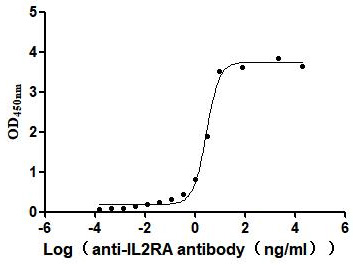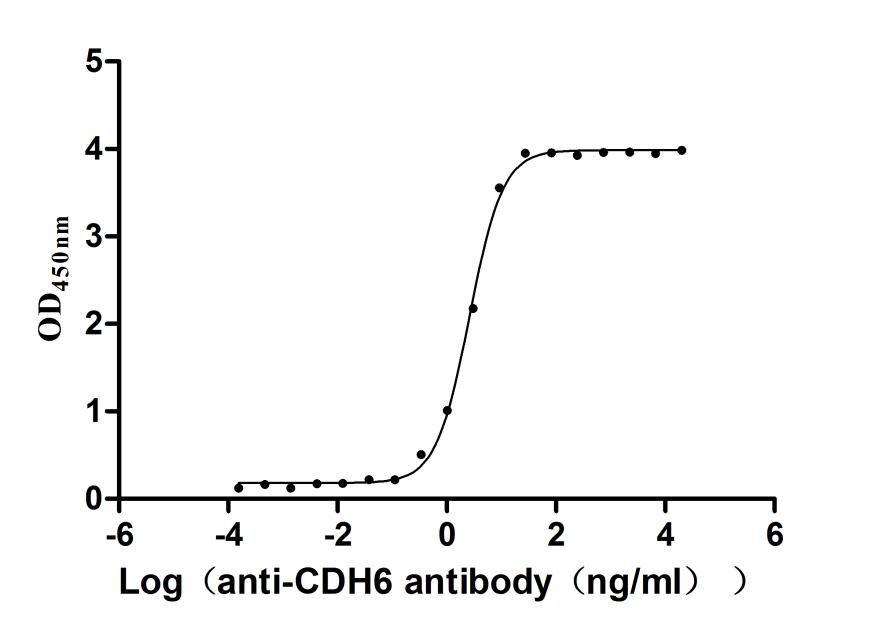Recombinant Human Dihydropyrimidinase-related protein 2 (DPYSL2)
-
中文名稱:人DPYSL2重組蛋白
-
貨號(hào):CSB-EP614975HU
-
規(guī)格:
-
來(lái)源:E.coli
-
其他:
-
中文名稱:人DPYSL2重組蛋白
-
貨號(hào):CSB-EP614975HU-B
-
規(guī)格:
-
來(lái)源:E.coli
-
共軛:Avi-tag Biotinylated
E. coli biotin ligase (BirA) is highly specific in covalently attaching biotin to the 15 amino acid AviTag peptide. This recombinant protein was biotinylated in vivo by AviTag-BirA technology, which method is BriA catalyzes amide linkage between the biotin and the specific lysine of the AviTag.
-
其他:
-
中文名稱:人DPYSL2重組蛋白
-
貨號(hào):CSB-BP614975HU
-
規(guī)格:
-
來(lái)源:Baculovirus
-
其他:
-
中文名稱:人DPYSL2重組蛋白
-
貨號(hào):CSB-MP614975HU
-
規(guī)格:
-
來(lái)源:Mammalian cell
-
其他:
產(chǎn)品詳情
-
純度:Greater than 85% as determined by SDS-PAGE.
-
基因名:DPYSL2
-
Uniprot No.:
-
別名:Collapsin response mediator protein 2; Collapsin response mediator protein; Collapsin response mediator protein hCRMP 2; CRAM; CRMP 2; CRMP-2; CRMP2; DHPRP 2; DHPRP2; Dihydropyrimidinase 2; Dihydropyrimidinase like 2; Dihydropyrimidinase like 2 long form; Dihydropyrimidinase related protein 2; Dihydropyrimidinase-related protein 2; DPYL 2; DPYL2; DPYL2_HUMAN; DPYSL 2; Dpysl2; DRP-2; DRP2; Musunc 33; Musunc33; N2A3; TOAD 64; TOAD64; ULIP 2 protein; ULIP-2; Ulip2; Unc-33-like phosphoprotein 2
-
種屬:Homo sapiens (Human)
-
蛋白長(zhǎng)度:Full length
-
表達(dá)區(qū)域:1-572aa
-
氨基酸序列MSYQGKKNIPRITSDRLLIKGGKIVNDDQSFYADIYMEDGLIKQIGENLIVPGGVKTIEAHSRMVIPGGIDVHTRFQMPDQGMTSADDFFQGTKAALAGGTTMIIDHVVPEPGTSLLAAFDQWREWADSKSCCDYSLHVDISEWHKGIQEEMEALVKDHGVNSFLVYMAFKDRFQLTDCQIYEVLSVIRDIGAIAQVHAENGDIIAEEQQRILDLGITGPEGHVLSRPEEVEAEAVNRAITIANQTNCPLYITKVMSKSSAEVIAQARKKGTVVYGEPITASLGTDGSHYWSKNWAKAAAFVTSPPLSPDPTTPDFLNSLLSCGDLQVTGSAHCTFNTAQKAVGKDNFTLIPEGTNGTEERMSVIWDKAVVTGKMDENQFVAVTSTNAAKVFNLYPRKGRIAVGSDADLVIWDPDSVKTISAKTHNSSLEYNIFEGMECRGSPLVVISQGKIVLEDGTLHVTEGSGRYIPRKPFPDFVYKRIKARSRLAELRGVPRGLYDGPVCEVSVTPKTVTPASSAKTSPAKQQAPPVRNLHQSGFSLSGAQIDDNIPRRTTQRIVAPPGGRANITSLG
-
蛋白標(biāo)簽:Tag?type?will?be?determined?during?the?manufacturing?process.
The tag type will be determined during production process. If you have specified tag type, please tell us and we will develop the specified tag preferentially. -
產(chǎn)品提供形式:Lyophilized powder
Note: We will preferentially ship the format that we have in stock, however, if you have any special requirement for the format, please remark your requirement when placing the order, we will prepare according to your demand. -
復(fù)溶:We recommend that this vial be briefly centrifuged prior to opening to bring the contents to the bottom. Please reconstitute protein in deionized sterile water to a concentration of 0.1-1.0 mg/mL.We recommend to add 5-50% of glycerol (final concentration) and aliquot for long-term storage at -20℃/-80℃. Our default final concentration of glycerol is 50%. Customers could use it as reference.
-
儲(chǔ)存條件:Store at -20°C/-80°C upon receipt, aliquoting is necessary for mutiple use. Avoid repeated freeze-thaw cycles.
-
保質(zhì)期:The shelf life is related to many factors, storage state, buffer ingredients, storage temperature and the stability of the protein itself.
Generally, the shelf life of liquid form is 6 months at -20°C/-80°C. The shelf life of lyophilized form is 12 months at -20°C/-80°C. -
貨期:Delivery time may differ from different purchasing way or location, please kindly consult your local distributors for specific delivery time.Note: All of our proteins are default shipped with normal blue ice packs, if you request to ship with dry ice, please communicate with us in advance and extra fees will be charged.
-
注意事項(xiàng):Repeated freezing and thawing is not recommended. Store working aliquots at 4°C for up to one week.
-
Datasheet :Please contact us to get it.
相關(guān)產(chǎn)品
靶點(diǎn)詳情
-
功能:Plays a role in neuronal development and polarity, as well as in axon growth and guidance, neuronal growth cone collapse and cell migration. Necessary for signaling by class 3 semaphorins and subsequent remodeling of the cytoskeleton. May play a role in endocytosis.
-
基因功能參考文獻(xiàn):
- cross-talk between distinct CRMP2 posttranslational modifications is a key factor in determining NaV1.7 trafficking and localization PMID: 27940916
- crystal structure of human tetrameric CRMP-2 PMID: 28044206
- increased pCRMP2 may underlie the axonal pathology of Lewy body dementias. PMID: 27609071
- These data identify a novel oncogenic mechanism where CDK5 activation induces CRMP2A phosphorylation in the nuclei of tumour cells PMID: 26555036
- polymorphisms of the DPYSL2 gene in humans may be associated with the development of schizophrenia. PMID: 25847191
- Functional variants in DPYSL2 sequence increase risk of schizophrenia and suggest a link to mTOR signaling PMID: 25416705
- Changes for CRMP2, TCP1epsilon, TPM2 and 14-3-3gamma were confirmed in experimental tumors and in a series of 28 human SI-NETs. PMID: 25224486
- Reduced CRMP2 expression and elevated expression of nuclear phosphorylated CRMP2 may be associated with breast cancer progression. PMID: 23381229
- Levels of total GSK3 were decreased in the Huntington disease-affected frontal cortex and this correlated with decreased phosphorylated CRMP2. PMID: 24634145
- High dihydropyrimidinase-related protein 2 expression is associated with lung cancer. PMID: 24518087
- genetic variants in DPYSL2 may play a role in susceptibility to alcohol dependence. PMID: 23846846
- A specific and reversible intermolecular Cys-504-Cys-504 dithiol-disulfide switch in homotetrameric CRMP2 determines two conformations of the quaternary CRMP2 complex that controls axonal outgrowth and thus neuronal development. PMID: 24133216
- CRMP-2-dependent regulation of ROCK II activity is mediated through interaction of the CRMP-2L N terminus with the ROCK II catalytic domain as well as by GSK3-dependent phosphorylation of CRMP-2. PMID: 24036111
- a novel regulatory mechanism that utilizes CRMP2 SUMOylation to choreograph NaV1.7 trafficking. PMID: 23836888
- a new insight into CRMP-2 as a controller of myosin II-mediated cellular functions through the inhibition of ROCK II in nonneuronal cells PMID: 22431514
- No Alzheimer disease-associated differences in CNP and DPYSL2 promoter DNA methylation were observed. PMID: 22954668
- Deletion analysis of CRMP-2 identified a 51 amino acid sequence in the C-terminus that is required for targeting to the basal body and primary cilium. This domain contains GSK-3beta phosphorylation sites. PMID: 23185275
- High levels of nuclear phosphorylated CRMP-2 is associated with lung cancer. PMID: 23023514
- CRMP2 hyperphosphorylation is speci fi c to Alzheimer's disease and is not a common event in all forms of dementia and neurodegeneration, especially other tauopathies. PMID: 21860090
- findings suggest a major role of phosphorylated CRMP-2 as a mechanism involved in process retraction induced by reactive oxygen species PMID: 22443207
- HTLV-1 has the capacity to influence the CRMP2/PI3K/Akt axis thus to positively control cytoskeleton organization and lymphocyte migration. PMID: 22227566
- CRMP2 controls dendritic projection; the phosphorylation of CRMP2 at Ser522 is essential for proper dendritic field organization for axonal guidance and spine development . PMID: 22279220
- This review discusses the essential biology of CRMP2 in the context of nascent data implicating CRMP2 perturbations as either a correlate of, or plausible contributor to, diverse neuropathologies. PMID: 21271304
- Data support DPYSL2 and the surrounding genomic region as a susceptibility locus for schizophrenia. PMID: 21302347
- Data provide the first trafficking regulatory role for Crmp2 in non-neuronal cells and support a model in which Crmp2 is an important endocytic regulatory protein that links MICAL-L1.EHD1-based vesicular transport to dynein motors. PMID: 20801876
- DPYSL2 does not have a major function in schizophrenia in Japanese subjects. PMID: 20414250
- CRMP2 as a tubulin direct binder may be a GTPase-activating protein (GAP) of tubulin in neurite formation and its GAP activity may be regulated by an intramolecular interaction with an N-terminal inhibitory region. PMID: 19666111
- Aberrant expression of dihydropyrimidinase related proteins-2,-3 and -4 in fetal Down syndrome brain. PMID: 11771764
- No significant associations were found between five polymorphisms of the DRP-2 gene and Bipolar Disorder, nor were associations detected between either of the polymorphisms and bipolar subtypes I and II. PMID: 12951196
- Here we show that glial cell line-derived neurotrophic factor (GDNF) enhances CRMP-2 expression in TGW human neuroblastoma cells via activation of RET receptor tyrosine kinase. PMID: 15207709
- significant decrease of crmp-2 protein may represent or underlie impaired neuronal plasticity, neurodegeneration, wiring of the brain in mesial temporal lobe epilepsy PMID: 15672539
- CRMP-2 transports the Sra-1/WAVE1 complex to axons in a kinesin-1-dependent manner and thereby regulates axon outgrowth and formation PMID: 16260607
- collapsin response mediator protein-2 transcriptional activity is inhibited by all-trans-retinoic acid during SH-SY5Y neuroblastoma cell differentiation PMID: 17229153
- These observations implicate hyperphosphorylation of CRMP2 as an early event in the development of AD and suggest that it can be induced by a severe APP over-expression and/or processing defect. PMID: 17683481
- results indicate that that CRMP-2 may be a novel colorectal cancer biomarker PMID: 18203259
- association of neurofibromin and CRMP-2 is essential for neuronal cell differentiation PMID: 18218617
- relative resistance to phosphatases might be a common feature of Cdk5 substrates and could contribute to the hyperphosphorylation of CRMP2 and Tau observed in Alzheimer disease PMID: 18460467
- Data suggest that collapsin response mediator protein-2 (CRMP-2) is a novel calmodulin-binding protein and that CaM binding may play an important role in regulating CRMP-2 functions. PMID: 19151921
- Given that CRMP-2 is a key regulator of axon elongation, this interference with cytoplasmic dynein function by CRMP-2 might have an important role in axon formation, and neuronal development PMID: 19659462
- A significant association was found between a single nucleotide polymorphism of the DRP-2 gene and schizophrenia in a North American sample. PMID: 15858820
顯示更多
收起更多
-
亞細(xì)胞定位:Cytoplasm, cytosol. Cytoplasm, cytoskeleton. Membrane. Note=Tightly but non-covalently associated with membranes.
-
蛋白家族:Metallo-dependent hydrolases superfamily, Hydantoinase/dihydropyrimidinase family
-
組織特異性:Ubiquitous.
-
數(shù)據(jù)庫(kù)鏈接:
Most popular with customers
-
Recombinant Human Cytotoxic T-lymphocyte protein 4 (CTLA4), partial (Active)
Express system: Mammalian cell
Species: Homo sapiens (Human)
-
Recombinant Mouse Complement component C1q receptor (Cd93), partial (Active)
Express system: Mammalian cell
Species: Mus musculus (Mouse)
-
Recombinant Human Tomoregulin-2 (TMEFF2), partial (Active)
Express system: Mammalian cell
Species: Homo sapiens (Human)
-
Recombinant Human Interleukin-2 receptor subunit alpha (IL2RA), partial (Active)
Express system: Mammalian cell
Species: Homo sapiens (Human)
-
Recombinant Macaca fascicularis C-type lectin domain family 4 member C(CLEC4C), partial (Active)
Express system: Mammalian cell
Species: Macaca fascicularis (Crab-eating macaque) (Cynomolgus monkey)
-
Recombinant Human Cadherin-6(CDH6),partial (Active)
Express system: Mammalian cell
Species: Homo sapiens (Human)


















